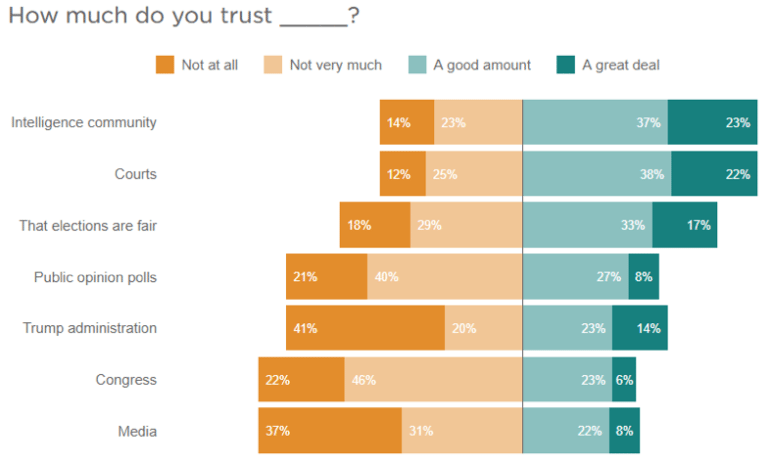
July 3rd, 2017; NPR
A recent poll by NPR, The Marist College Institute for Public Opinion, and PBS NewsHour finds that both public trust in the nation’s institutions and the perceived civility of the nation’s public dialogue are decreasing rapidly under President Trump. The decrease has been noted by Democrats, Independents, and Republicans, but it’s little comfort to the public to realize this is a point of consensus for our nation’s lawmakers. Elected officials of all stripes have been calling out the President’s ill-considered public comments and have begged him to “Stop it!”
There are many reasons nonprofits should be concerned about these poll numbers. As frequent partners with government in delivering services, building communities, and protecting democracy, nonprofits could end up being guilty by association. Certainly, increased scrutiny and skepticism of the sector in the last decade has shown that nonprofits themselves are not exempt from similar types of criticism.

It’s interesting to note that while only 37 percent of adults polled reported trusting the Trump administration, an even smaller number (29 percent) reported trusting Congress. Members of Congress need to continue to call out the President’s hateful rhetoric and hold him to a higher standard, if only to distance themselves from his erratic behavior. Perhaps one of the reasons the public rated their trust in the Courts higher, at 60 percent, is that there are more publicly visible challenges to Trump’s policies from the judicial branch than from the legislative branch.
Despite the president’s attacks on the CIA and the FBI for investigating his campaign’s alleged commingling with the Russians, the public demonstrated equally high levels of trust in the intelligence agencies. This may be due to career public servants, who tend to remain in key positions from administration to administration. Indeed, they may be our best hope to protect general government protocols and the rule of law.
Sign up for our free newsletters
Subscribe to NPQ's newsletters to have our top stories delivered directly to your inbox.
By signing up, you agree to our privacy policy and terms of use, and to receive messages from NPQ and our partners.
The president’s repeated verbal attacks on the media and the elections are having a clear effect. This is an area where the poll showed different perceptions along party lines; adults who consider themselves Democrats were more likely to report trust in these institutions than Republicans. This political divide showed up in other areas of civil rights as well: 44 percent of Democrats think that the right to vote has been restricted too much, but 25 percent think it has been expanded too much, something nonprofits may want to note in their advocacy efforts.
But does the poll itself prove anything? Public opinion on even this issue varies significantly by party, says NPR:
There’s similar distrust of public opinion polls, which just more than 6 in 10 Americans say, to some degree, they don’t trust. Half of Democrats, however, say they do, while just 28 percent of Republicans say they trust surveys. Thirty-four percent of independents say they trust public opinion polls, while 63 percent don’t have either much or any trust in them.
Regardless, nonprofits should take note of this snapshot and not take public support for granted. Furthermore, we too must be mindful of how we talk about our partners in government and realize we are stronger together in meeting the public’s demands.—Jeannie Fox













